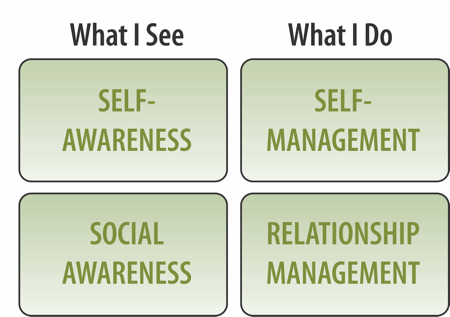By Dr. Travis Bradberry & Lac D. Su, M.S.
The Technical Manual for the Emotional Intelligence Appraisal reveals interesting findings from a study of more than 13,000 individuals worldwide. Employees from various job functions, in different organizations and countries, were asked to evaluate their emotional intelligence by answering 28 questions. Job functions included sales, marketing, finance, operations, customer service, human resources, information technology (IT), engineering, business development, manufacturing, and R&D.
The Emotional Intelligence Appraisal measures EQ in the four components from the #1 benchmark model of emotional intelligence:

The Data Says
Contrary to popular belief, EQ scores were consistent across various job functions─except for engineering who scored slightly lower than average. It’s likely that engineers are not rewarded much for effective relationships with others. Especially when compared to jobs like customer service professionals—the only group who scored higher than average.
The stereotype placed on engineers is that they prefer to work alone. It’s unlikely this is always the case, but given their work environment, they are most comfortable and rewarded for detaching from the social arena at work.
Why So Antisocial?
When your interaction with people is minimal, your focus on people is minimal. An engineer’s attention is mainly directed at computers, equipment, or other inanimate objects like project blueprints and specs.

The Four EQ Skills Measured by the Emotional Intelligence Appraisal:
-
- Self-Awareness: Your ability to accurately perceive your own emotions and stay aware of them as they happen. This includes keeping on top of how you tend to respond to specific situations and people.
- Self-Management: Your ability to use awareness of your emotions to stay flexible and positively direct your behavior. This means managing your emotional reactions to all situations and people.
- Social Awareness: Your ability to accurately pick up on emotions in other people and get what is really going on. This often means understanding what other people are thinking and feeling even if you don’t feel the same way.
- Relationship Management: Your ability to use your awareness of your emotions and the emotions of others to manage interactions successfully. This includes clear communication and effectively handling conflict.
Most employers forget that a good engineer generates innovative ideas that can drive the success of the company. These ideas will not mature properly in isolation.
What About Personality?
Most engineers given a personality assessment, such as the MBTI or the DISC, gravitate towards introversion. At the same time, engineering is a profession that requires a high degree of cognitive intelligence to succeed. The commonly held assumption is these two traits (i.e. personality and intelligence) must go together.
Smart or not, engineers (and other introverted personalities) deal with another “type” of dilemma. Their quiet, thoughtful, and sometimes sensitive personality can make reaching out to others a chore. When this lack of desire is seen as inability, engineers are left to themselves. The consequences of this situation are dire for the performance of any organization
Something To Think About
Collaboration with others in the workplace means actively working together to meet target goals. The ability to openly exchange ideas and provide feedback helps people achieve.
Even jobs that require high IQ and isolated work can benefit from emotional intelligence. Take for example, a team of surgeons successfully transplanting a heart, or a group of engineers collectively designing and building a dam that can potentially save millions of lives in China.
Successful group effort toward winning results feels great—regardless of your personality. The victorious heart transplant and life-saving dam are the result of people working in collaboration. The job can sometimes be done alone, but things work better when people work together. The good news is emotional intelligence is a flexible skill that anyone can learn, introvert or not.
ABOUT THE AUTHOR:
Travis Bradberry, Ph.D.
Dr. Travis Bradberry is the award-winning co-author of Emotional Intelligence 2.0 and the cofounder of TalentSmartEQ, the world’s leading provider of emotional intelligence tests, emotional intelligence training, and emotional intelligence certification, serving more than 75% of Fortune 500 companies. His bestselling emotional intelligence books have been translated into 25 languages and are available in more than 150 countries. He is a frequent keynote speaker at public and private engagements. Dr. Bradberry has written for, or been covered by, Newsweek, BusinessWeek, Fortune, Forbes, Fast Company, Inc., USA Today, The Wall Street Journal, The Washington Post, and The Harvard Business Review.
Lac D. Su, M.S.
Lac D. Su is the Director of Strategic Alliances for TalentSmartEQ, the leading provider of emotional intelligence tests, products, and training. He forms and manages relationships with key TalentSmartEQ resellers and assists clients with the implementation of skill development initiatives.